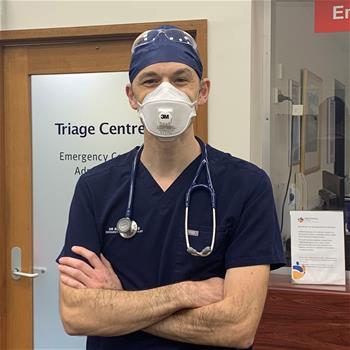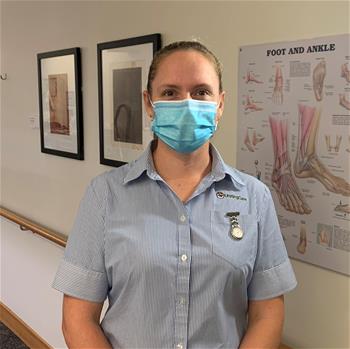Playing sports is a great way to get outdoors, stay active and healthy, reduce stress and socialise with others. But the sporting field can also be a place for unwanted accidents and injuries.

Over the winter months, the
St Andrew’s Emergency Centre anticipates an increase of sports related injury presentations as kids and adults alike get back into sports like rugby and netball.
To help our community play it safe this winter, St Andrew’s emergency specialist,
Dr Simon Rohde, and musculoskeletal physiotherapist, Cassandra Binstead, share their expert advice and helpful tips.
What are the most common sports injuries you see in the Emergency Centre?
Dr Rohde: Most commonly we see and treat sports injuries of the ankle, knee and shoulder. The most common ankle injuries include fibula fracture (outside the ankle bone) and ligament injury. In knees, we also see ligament injuries such as ACL, PCL and meniscus tears, as well as dislocations of the patella or ‘knee cap’. In shoulders, ligament injuries are common, as well as fractures of the collar bone and shoulder dislocation which can be painful.
Depending on the severity and type of injury, treatment can include a moonboot and/or crutches, knee splint, and in some cases surgery, while less severe injuries can often be managed with physiotherapy. Many of our patients with sports injuries will also be referred for review with one of our
orthopaedic surgeons.
 What first aid is recommended after sports injury?
What first aid is recommended after sports injury?
Dr Rohde: Pain relief, application of ice, splinting the area to reduce movement either with a shoulder sling or a rigid support for a limb injury, followed by a fast review in the Emergency Centre.
Cassandra: We also recommended avoiding ‘HARM-ful’ activities in the first 72 hours after an injury, which are heat and heat rubs, alcohol, running or moderate activity and vigorous massage. Always see a doctor or physio to get your injury assessed, this will get you started on the optimal recovery path as soon as possible.
Concussion can sometimes occur in sports such as rugby and football. What are the symptoms to look out for and what treatment is needed?
Dr Rohde: The concern with head injuries is primarily a skull fracture or bleed within the skull. Concerning symptoms include severe headache, vomiting, loss of consciousness, amnesia, any weakness or numbness, seizures or unusual behaviour. If there are any concerns, an ambulance should be called and the patient brought to the Emergency Centre.
Care should also be taken to consider and manage a neck injury at the same time by keeping the neck still and ideally applying a c-spine collar. Once a dangerous head injury is excluded consideration of concussion management can begin.
What can we do to help prevent getting injured while playing sport?
Cassandra: To help prevent injury and play at your best, it is a good idea to gradually build up your fitness, and the flexibility and agility needed for the sport before you start to play. On game day, it’s a good idea to do a good warm up that includes jogging and stretching, plus a few sport specific drills. After the game, try doing a warm down followed by more stretches.
What are your tips for recovery and returning to sport after injury?
Cassandra: Consult a physio to help you get back to sport faster with less chance of re-injury. They will help you improve your strength, balance and flexibility and guide you with a graduated return to sport. It can also be useful to tape or brace the injured area when you first go back to sport, and your physio can teach you the right taping techniques to use.
St Andrew’s War Memorial Hospital offers an around-the-clock specialised Sports Injury Service for patients of all ages. Patients can access the service 24/7 by presenting to the St Andrew’s Emergency Centre, and recognised sporting organisations and schools are offered a reduced out-of-pocket consultation fee when they present with a sporting injury.
For outpatient physiotherapy appointment bookings or enquiries, please phone 07 3834 4285 or email sawmh-dayrehab@uchealth.com.au.